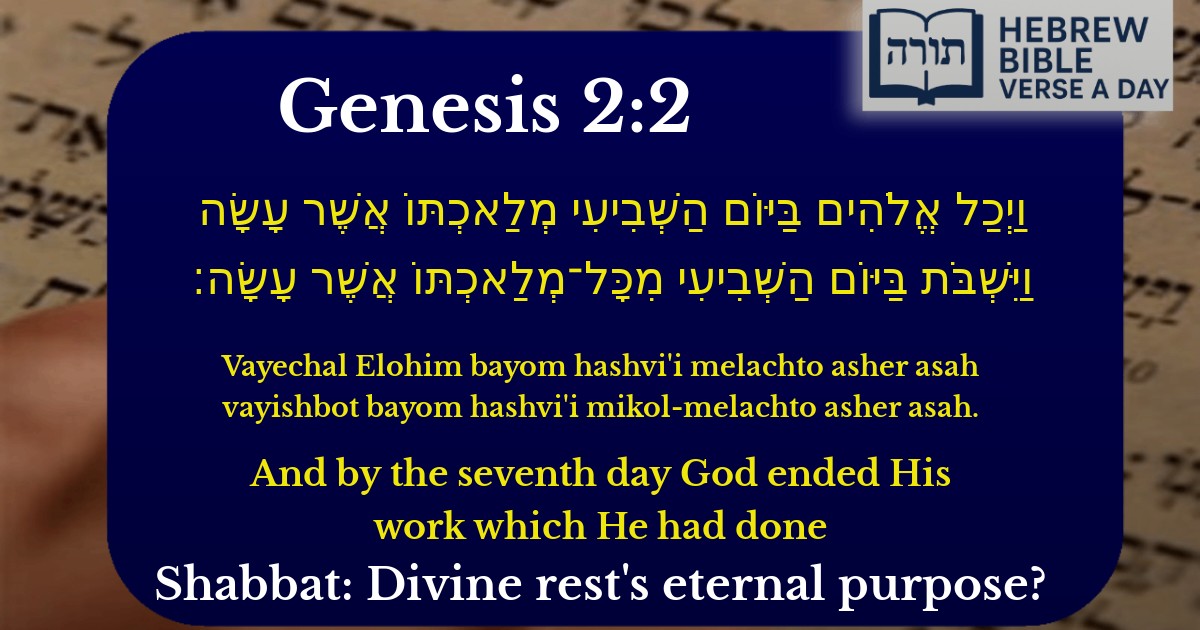Frequently Asked Questions
Q: What does Genesis 2:2 mean when it says God 'ended His work' on the seventh day?
A: According to Rashi, this verse teaches that God completed all of creation by the seventh day, even though no new creations were made on Shabbat itself. The phrase 'ended His work' means that on Shabbat, creation reached its intended completion and perfection.
Q: Why is the seventh day (Shabbat) special in Genesis 2:2?
A: The Torah emphasizes the seventh day because God sanctified it as a day of rest (Shabbat). As Rambam explains, Shabbat serves as a testimony to God's creation of the world in six days and His resting on the seventh. It's a fundamental Jewish belief and mitzvah to observe Shabbat.
Q: What can we learn from God resting on the seventh day in Genesis 2:2?
A: The Midrash teaches that just as God rested from creative work on Shabbat, we too must refrain from melacha (creative labor) on Shabbat. This verse establishes the 39 categories of prohibited work that define Shabbat observance in Jewish law (based on the types of work done to build the Mishkan).
Q: How does Genesis 2:2 apply to Jewish life today?
A: This verse is the biblical source for the mitzvah of Shabbat observance. The Talmud (Shabbat 10a) explains that by keeping Shabbat, we emulate God and testify to His creation of the world. Orthodox Jews today strictly observe Shabbat by refraining from work and dedicating the day to prayer, Torah study, and family.
Q: Does Genesis 2:2 mean God was tired and needed to rest?
A: No, as Rashi clarifies, God doesn't get tired or need rest. The concept of 'resting' here means ceasing from creative activity. The Sforno explains that God stopped creating to show that the world was complete and perfect, teaching us the importance of setting aside time for spiritual renewal rather than constant physical labor.


Completion of Creation on the Seventh Day
The verse states: "וַיְכַל אֱלֹהִים בַּיּוֹם הַשְּׁבִיעִי מְלַאכְתּוֹ אֲשֶׁר עָשָׂה" ("And by the seventh day God ended His work which He had done"). Rashi explains that the phrase "וַיְכַל" ("ended") does not imply that Hashem needed the seventh day to complete His work, for all creation was fully formed by the sixth day. Rather, it teaches that the act of resting itself was part of the divine plan—a "completion" of creation through cessation, establishing Shabbat as a foundational principle for mankind.
The Concept of Shabbat as a Divine Model
Rambam (Hilchot Shabbat 30:2) derives from this verse that just as Hashem abstained from creative labor on the seventh day, so too must mankind emulate this divine model. The Midrash (Bereishit Rabbah 10:9) elaborates that Shabbat was the final "creation"—not a physical entity, but a sanctified time, demonstrating that the world's purpose extends beyond material productivity.
Why the Torah Emphasizes "מִכָּל־מְלַאכְתּוֹ"
The repetition of "מִכָּל־מְלַאכְתּוֹ אֲשֶׁר עָשָׂה" ("from all His work which He had done") underscores two ideas, as noted by the Sforno:
The Seventh Day as a Testimony
The Talmud (Shabbat 69b) teaches that Shabbat serves as eternal testimony to Hashem as Creator. By refraining from work, Jews affirm belief in the six days of creation, rejecting philosophies that claim the universe is eternal. This aligns with Rambam's (Moreh Nevuchim 2:31) explanation that Shabbat reinforces the foundational principle of yesh me'ayin (creation ex nihilo).